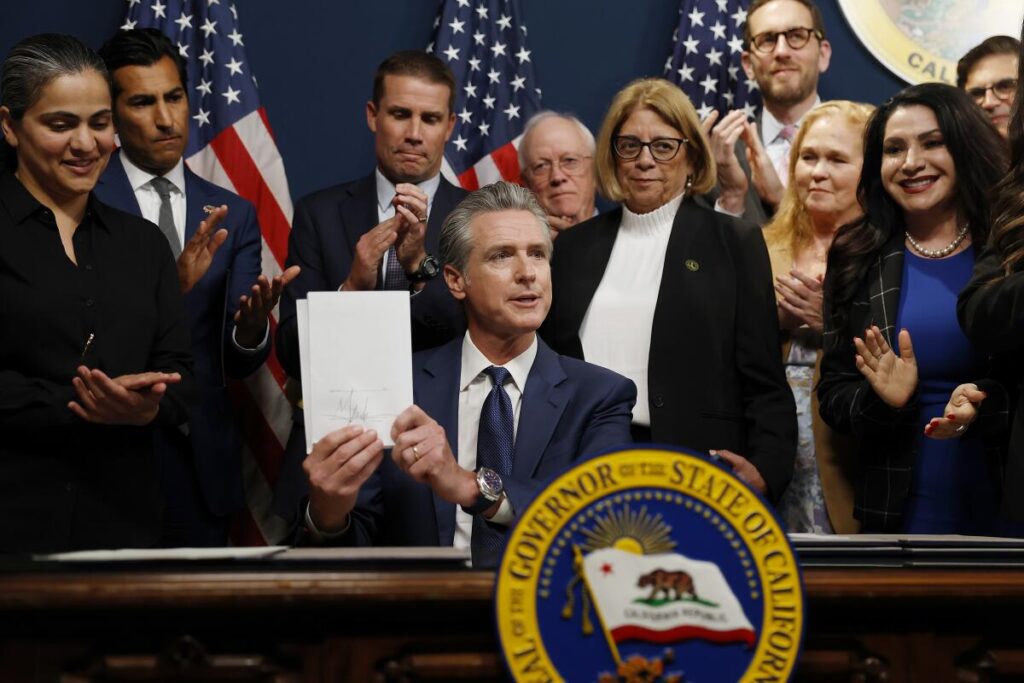
UPDATE: California Republicans have just filed a lawsuit to block Governor Gavin Newsom’s controversial redistricting plan from appearing on the ballot this November. The move comes as part of a desperate bid to maintain the state’s nonpartisan congressional districts amid rising tensions over electoral fairness.
In a detailed 432-page lawsuit submitted to the California Supreme Court on Monday, Republican lawmakers argue that the hastily created Proposition 50 violates the California Constitution. They contend that the Democrats’ initiative undermines the rights of Californians to fair and unbiased electoral maps.
This legal challenge follows a previous emergency petition, which the Supreme Court denied without a hearing just last week. The proposed ballot measure, set for November 4, 2024, seeks to dismantle nonpartisan congressional districts, favoring partisan boundaries that could benefit Democrats significantly in upcoming elections.
Michael Columbo, attorney for the plaintiffs, asserts that the dual questions presented by the proposition—whether to amend the U.S. Constitution for independent redistricting nationwide and whether to eliminate nonpartisan districts—constitute an “illegal, take-it-or-leave-it choice” that violates the state constitution’s requirement for single-issue ballot measures.
However, legal experts like David A. Carrillo, executive director of Berkeley Law’s California Constitution Center, argue that the focus on redistricting provides a common subject sufficient for inclusion on the ballot.
Adding to the controversy, former President Donald Trump announced on Monday that the Justice Department plans to sue California over the redistricting plan, asserting a belief in the success of their legal challenge. Responding to Trump’s threat, Newsom stated boldly on social media: “BRING IT.”
A spokesperson for Shirley N. Weber, the California Secretary of State, declined to comment on the lawsuit. Hannah Milgrom, representing the Yes on 50 campaign, dismissed the Republican efforts as another futile attempt to thwart voters from having their say, stating, “Trump’s toadies already got destroyed once in court.”
The lawsuit also claims that the California Legislature bypassed constitutional protocols by proposing new congressional districts without first securing voter approval to suspend existing independent redistricting laws. According to Republicans, this legal framework is essential to uphold the integrity of California’s electoral process.
The stakes are high as the legal battle unfolds. The California Supreme Court rarely removes voter initiatives from the ballot, making it unlikely they would take such drastic action in this case. Nevertheless, the court has the power to intervene if they find substantial legal grounds.
In a related development, opponents of Proposition 50 have filed a public records request with state Attorney General Rob Bonta, seeking transparency regarding communications between Democratic leaders about the measure’s portrayal on the ballot. Jessica Millan Patterson, former California GOP chair, emphasized the need for clarity, stating, “Voters deserve to know if these top Democrats are actively trying to put their thumb on the scale.”
As this urgent legal battle develops, the implications for California’s electoral landscape—and potentially national politics—are monumental. Voters will need to stay informed as the clock ticks down to the November election, where their voices will ultimately decide the future of congressional redistricting in the state.







